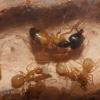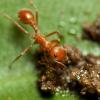Why the hell is it not a god idea? Ants are super useful to the ecosystem and in Germany there's even efforts to actively spread Formica rufa (the ant is threatened and population has gone down a lot in recent years which is bad for everyone as they keep the woods clear). As long as it is a native species it isn't a problem at all. Worst thing that can happen is that they don't survive.
I remember reading a post, perhaps by gcsnelling himself on Yuku, which listed a few reasons why releasing ants back into the wild from captivity is a bad thing:
1) Your ants could be carrying some kind of disease or parasite that may not have been present in the new area that you are releasing them into regardless of whether or not that species occurs there naturally.
2) You could be introducing new genes into the population which can potentially make future study more difficult.
Or at least that's what I remember reading but I could easily be mistaken.
Another thing that occurs to me is that amateur ant keepers are quite poor at species identification and are really happy to call ants they have captured as one species they see online that has some physiological similarities without bothering to go through the trouble of using a taxonomic key or expert identification to verify their haphazard ID. So this amateur thinks that have species A that occurs in the area that they are planning to release their ants into, but actually they have physiologically similar but distinct non-native species B. Perhaps introduction of this species B into the environment in question will be totally harmless because they can't survive there anyways; or maybe some geographical barrier was preventing them from moving into this new environment and now you've given an excellent foothold to a brand new invasive species that at best will be a harmless addition to the local ecosystem and can at worst cause the extinction of other competing species as well as other non-ant species that are not adapted to deal with this new species. Additionally there is a potential for unforeseen consequences to lead to billions of dollars in economic damages if this new invasive turns out to be chronically destructive to agricultural activity or to various domestic or commercial structures. These latter consequences are probably very unlikely for any given ant to be introduced into a temperate climate that they are not accustomed to, but I think that most reasonable people will agree that there is no reason to risk finding out.
Regarding your suggestion that adding ants to Germany will not be a problem because Germany is actively trying to increase the amount of Formica rufa colonies: I believe that you are mistaken in your belief that all ants are equivalent. Even for native species there are so many factors to consider when you go about changing the relative balance of species of any type of animal in any environment that it is ridiculous to suggest that an amateur with no in depth knowledge of this subject should go around releasing colonies or individuals of whatever species regardless of whether or not that species occurs in that environment naturally. Also, it is possible that if your "native" species colony that you collected hundreds of miles away has a parasite or disease of some sort that does not occur among the population of that species in this new target area, you could be spreading that parasite to this new population that does not have the proper immunological defenses for it. Further, there is as with many diseases and parasites the potential to transfer hosts. So perhaps your well-meaning introduction of diseased ants of whatever species introduces a pathogen of whatever sort to Formica rufa and now the ants that are already present in insufficient numbers become even more scarce. Humanity's experience with disease is an excellent example of these types of outcomes. This result is also not very likely, but again I do not think that there is any reason to risk finding out.
While amateur ant keepers going around releasing random ant colonies of whatever kinds into new environments and then talking about it online isn't a good idea for the reasons listed above, it is however an excellent way to attract the attention of both law enforcement agencies and regulatory bodies that work to prevent from occurring the negative outcomes that I described above. These organizations can be sufficiently motivated to legislate and regulate away your ability to legally import and transport ants in your area if it becomes apparent that reckless hobbyists have made it necessary to do so.
Edit:
Something else that has also occurred to me is that is is not too uncommon for one wide-ranging species that is physiologically nearly-identical across its entire range to be later split into multiple species as a result of new observations that show that different populations in different areas display different behaviors despite their visual similarity. So perhaps you release a colony of "Formica rufa" that you collected several hundred miles away into an area that desperately needs more Formica rufa according to the local forestry experts, but actually you released unknowingly-improperly described "Formica sort-of-rufa" that while 95% similar has a slight behavioral difference that causes the opposite of whatever desirable effect on the environment that you were attempting to achieve. Or even if it has a neutral effect on the forest overall, the beneficial actual Formica rufa is now competing against a mostly identical species for mostly identical nesting spots and food sources, and so while maybe you have the same amount of F. rufa-like ants in a given area, you might have less actual F. rufa doing the desirable things that you wanted more of them to do.
Edited by Reacker, November 26 2016 - 7:43 PM.
























